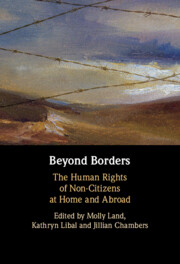Acknowledgments
We are grateful to the numerous people and institutions that made this book possible. We are indebted to our contributors, who first gathered in April 2017 at the University of Connecticut’s (UConn) Stamford Campus to discuss the relationship between citizenship and human rights through an interdisciplinary lens. In particular, we thank Eleanor Acer, who was our keynote speaker at the conference. We are also grateful to Connecticut Students for a Dream, who organized a session with conference participants on the day before the conference to introduce us to their work and the challenges they face on a daily basis.
The conference and the publication of this book under an open access license were made possible by the Senator Joseph I. Lieberman Conference & Lecture Series on Human Rights Practice. Cambridge University Press’s Gold Open Access license allows anyone anywhere around the world to read, download, and utilize the material in this volume directly from Cambridge University Press under a Creative Commons license. We are proud of this arrangement and hope that it becomes the norm for all scholarly work that relates to human rights and human flourishing.
We are deeply appreciative of the financial support provided by the University of Connecticut’s Office of Global Affairs and the Human Rights Institute, as well as crucial logistical and administrative support provided for the 2017 conference by Rachel Jackson, Lyndsay Nalbandian, Nana Amos, Susan Rosman, Carolyn Golden, Cara Workman, Kathy Harrison, Terrence Cheng, Zahra Ali, and Heather McDonald. We are especially grateful to the conference steering committee for their thoughtful feedback and advice as we planned the conference: Nehama Aschkenasy, Jon Bauer, Mary Cygan, Samuel Martinez, Glenn Mitoma, Ingrid Semaan, and Rich Watnick. We are also thankful for the ongoing support of Dan Weiner, Vice President of Global Affairs, for his support of this volume and the associated conference, as well as his unfailing promotion of human rights at UConn. Our thanks also to Co-Lab for their design of the conference poster and for their permission to use that design for the cover of this volume.
In particular, we owe a profound debt to Cathy Buerger, who, as part of her responsibilities as a postdoctoral fellow with the Human Rights Institute, played an invaluable role in bringing the conference to fruition. Without her intellectual leadership in collecting and curating research materials associated with the conference as well as her enthusiasm and organizational skills in bringing the conference together, this volume would not have been published.
Molly Land would like to thank the School of Law for summer fellowship support for her research on these issues and Taylor Faranda Korthuis for her research assistance in planning the conference. Kathryn Libal would like to acknowledge the School of Social Work for its ongoing support for her activities in the Human Rights Institute and the Office for the Vice President of Research for financial assistance in the preparation of the index for this volume. Jillian Chambers would like to acknowledge her professors at both the School of Law and the Human Rights Institute for their mentorship, encouragement, and commitment to providing students with meaningful opportunities to grow as writers and practitioners.
It almost goes without saying that a project like this demands sacrifice from family members at critical points of the editorial process. Our deepest thanks to our families for their love, patience, and support throughout the production of this volume.
Finally, we dedicate this volume to Lyndsay Nalbandian, whose love, support, and unfailing good cheer touched countless lives at the Institute and the University. You are sorely missed.

